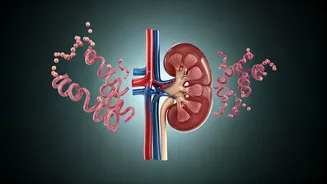Kidneys Under Pressure
High protein intake, especially from animal sources, places a significant burden on the kidneys. When you consume excess protein, your body produces more
urea and nitrogen as byproducts of protein metabolism. These waste products must be filtered out by your kidneys. This increased workload can be particularly risky for individuals with existing kidney conditions, potentially exacerbating their problems and accelerating kidney damage over time. Animal-based proteins tend to be more problematic in this regard compared to plant-based sources due to their higher purine content, which contributes to increased waste production.
Weight Gain Reversal
Protein can be helpful for short-term weight loss, however, overconsumption can actually hinder long-term progress. While protein promotes satiety, leading to reduced calorie intake initially, a consistent excess of protein, in excess of the body's requirements, can contribute to a caloric surplus. When you consume more calories than your body uses, the surplus is stored as fat. This can reverse the initial benefits of increased protein intake, leading to weight gain and potentially nullifying the gains in metabolism. It underscores the importance of a balanced diet with proper portion control.
Micronutrient Deficiencies
A singular focus on protein can often lead to an unbalanced diet, potentially compromising your intake of essential micronutrients. People who overemphasize protein-rich foods frequently reduce their consumption of plant-based foods such as fruits, vegetables, whole grains, which are essential sources of vitamins, minerals, and antioxidants. These micronutrients play vital roles in various bodily functions, including immune health, cell repair, and disease prevention. Skimping on these crucial nutrients can create deficiencies, potentially weakening your immune system and increasing your risk of chronic diseases.
Digestive System Distress
Excessive protein intake, particularly when combined with low fiber consumption, can significantly disrupt your digestive health. Protein-rich diets, without sufficient fiber, can often result in constipation, bloating, and an overall imbalance in the gut microbiome. Fiber, commonly found in fruits, vegetables, and whole grains, is crucial for promoting regular bowel movements and maintaining a healthy gut environment. Reduced intake of these fiber-rich foods can lead to sluggish digestion and uncomfortable symptoms. This imbalance can affect nutrient absorption and overall digestive comfort, highlighting the interplay between dietary choices and gut health.
Heart Health Concerns
High-protein diets, especially those heavily reliant on red or processed meats, may elevate your risk of heart disease over time. Red and processed meats tend to be rich in saturated fat and cholesterol, both of which are known contributors to the buildup of plaque in arteries. This buildup can lead to heart disease. Increased intake of these fats can raise cholesterol levels and increase the risk of cardiovascular events. It emphasizes the importance of choosing lean protein sources and maintaining a balanced diet to support heart health and reduce the risk of future problems.
Dehydration Risks Arise
The metabolism of protein requires a significant amount of water to flush out waste products. Consuming excessive amounts of protein without adequate fluid intake can easily lead to mild dehydration and fatigue. As your body breaks down protein, it produces nitrogenous waste products. These substances need to be eliminated through urine, which requires ample hydration. If you're not drinking enough water to keep up with the increased waste removal process, your body may become mildly dehydrated. This can lead to fatigue, reduced cognitive function, and other related health issues. The importance of staying well-hydrated is critical when you have a high protein intake.


















